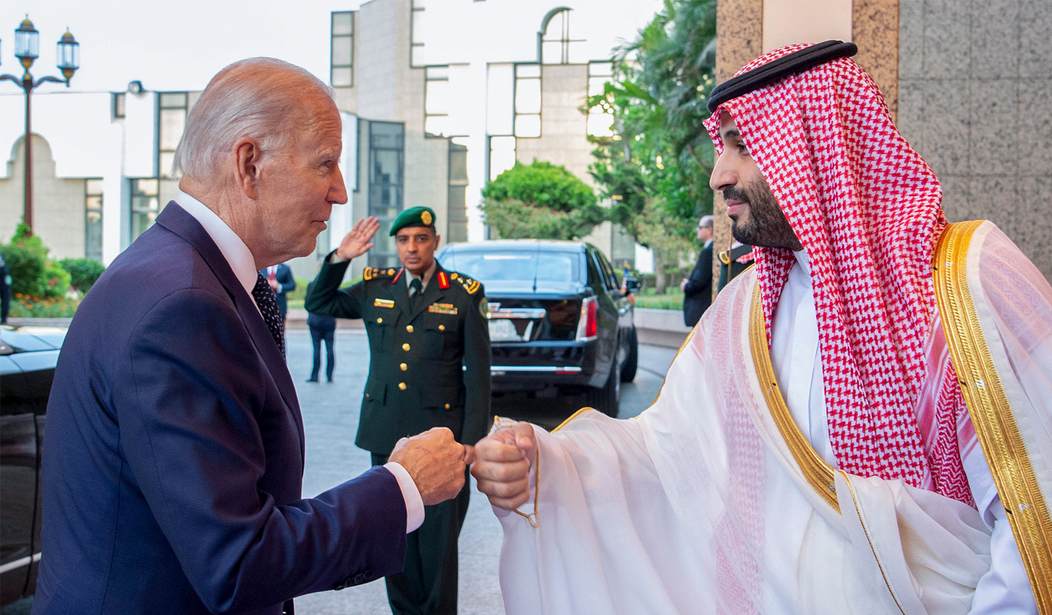President Biden’s recent trip to the Middle East, which should have been hailed as a display of continuity of U.S. policy in pursuit of increased regional integration, was instead defined by the controversy surrounding Biden’s meeting with Mohammed bin Salman. As soon as news of the trip was leaked, journalists leapt at the irony of the situation: a president, who as candidate had vowed to make Saudi Arabia a pariah, now forced to engage with the Crown Prince for help with oil prices.
But the contortions Biden put himself through to avoid appearing too close to MBS were both poorly disguised and counterproductive to real U.S. interests. Instead of a fist bump, Biden should have given MBS a hug. Here’s why: beyond driving rights for women the significant reforms implemented by the new Crown Prince are achieving what the U.S. could not in its countering violent extremism policy over the last decades.
The latest was a remarkable decision by Saudi leadership to appoint Sheikh Muhammad bin Abdul Karim Al-Issa, known for his visit to Auschwitz and interfaith dialogue, to give the main Eid- Al Adha sermon near the holy city of Mecca, the holiest site for Muslims around the world. Over the last few years, Al-Issa has represented the new face of Saudi Arabia, playing a key role in promoting moderation while fighting extremism, hate speech, and antisemitism.
For Saudi leadership, appointing Al-Issa was a courageous step, among many, and one for which it faced harsh criticism. Twitter erupted with more than 100K tweets bashing this decision under the hashtag “Remove Al Issa from leading the Eid ceremony” ( #??????_??????_??_?????? ), but Al - Issa ‘s prayer in Al-Masjid Al-Haram in Mecca went as planned.
Recommended
Under Crown Prince Mohammed Bin Salman, Saudi Arabia is taking the lead in combating Islamist extremism, cracking down on the Jihadist institutions and clerics that motivated terrorist organizations with radical ideologies for decades. These efforts are delivering in ways that the United States could not, not with more than 20 years of combat operations and trillions of dollars in spending in its so-called Global War on Terrorism.
Under MBS, Saudi Arabia’s Islamic influence abroad has undergone radical change. Saudi religious institutions and charities, which once funneled money and screed to extremist groups have been curtailed, now limited to the Muslim World League and the King Salman Center for Humanitarian Relief. Steps like these ensured that no Saudi money would finance radical groups or ideas overseas. Beyond that under the Crown Prince’s reforms, Saudi Arabia has offered the Muslim youth around the world a strong religious alternative, the narrative led by Sheikh Al Issa, which is dominating all the religious teaching around Saudi Arabia and the Muslim World.
The shift in the Saudi educational system is further proof that reforms there are not just rhetorical. Antisemitic sentiments have largely been eliminated from Saudi textbooks, and teachers who are considered radical have been removed from classrooms and replaced with moderate voices who are responsible for educating an entire generation of Saudis.
Reforms in Saudi Arabia are far from a transition toward western democracy. But, if America’s goal is to preserve its interests in the Middle East and to improve human rights in Saudi Arabia, the United States should embrace the ongoing change in the Kingdom and encourage MBS to go further.
Treating Saudi Arabia like a pariah, as President Biden promised on the campaign trail, won’t do that. Instead, it will push the Kingdom and other GCC allies toward China and Russia, which have their own abysmal records on human rights. Certainly, their military aid wouldn’t be predicated on anything other than self-interest and the further diminution of American influence in the region. Such a strategic realignment would do nothing to improve the Kingdom’s human rights record, the ostensible reason for Washington’s icy stance for the past year and a half.
And while no one is advocating that the United States simply forget the Khashoggi affair, its concerns over human rights with Saudi Arabia should be considered in their full context. Repugnant as the episode was, and as concerning as continued abuses like politically motivated detentions are, the Kingdom is on a trajectory the United States had longed hoped for – women are gaining new rights, Saudi society is opening to Western culture, and perhaps most importantly, it is shifting toward a more moderate version of Islam that could reshape, once again, the Muslim world.
Hadeel Oueis is a research fellow at the Philos Project and a US foreign policy analyst for several Arabic news networks.

























Join the conversation as a VIP Member